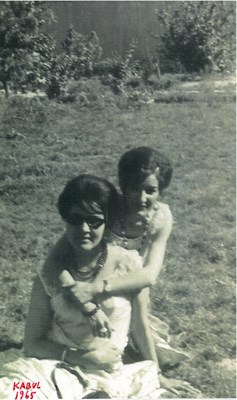Brishkay Ahmed assumed burqas had always been the norm in Afghanistan until her father told her otherwise.
While reviewing the subtitled scenes of Afghan divorcees clad in blue burqas streaming in and out of a Kabul legal centre in her 2010 documentary Reclaiming Rights, the Â鶹´«Ã½Ó³»filmmaker said her father, a former Counsel General of Afghanistan, told her that the burqa wasn't an Afghan garment.
Ahmed was shocked. She recalled Afghanistan-the country she'd left when she was five- through the photos in her parents' album, which showed her mother decked in sleeveless dresses, mini skirts and stylish slacks. But those images had long been knocked out of her consciousness by the images of shrouded, faceless women she'd seen on BBC and CNN.
Ahmed travelled to Afghanistan in 2011 to explore the history and origin of the burqa in her native land. Her Story of Burqa: Case of a Confused Afghan premieres at the DOXA Documentary Film Festival, May 10.
"I have nine-year-old girls who are twins, and that is the main reason why I wanted the film to finish this year," the 36-year-old resident of Oakridge said. "Because nine years old is when Islamic extremists begin covering up the girls entirely. It's that age when they say a girl has become a woman."
Ahmed explores the burqa on Davie Street, in tailors' shops in Afghanistan, through interviews with women, husbands and highranking Afghan historians and officials. The film incorporates bits of stock footage and animation.
She shoots from inside the often polyester garment to show how difficult it is to see and move with a mesh panel covering one's eyes and limited peripheral vision.
"Are you going to get your driver's licence if you wear it? No," Ahmed said. "Are you going to fly a plane? No."
The Story of Burqa uncovers the politics behind the controversial full-body garment from its ties to the harems of Indian kings to the influence of British foreign policy, Russian rule and the Taliban, and how it has little to do with religion.
According to Ahmed, many Afghanis, including herself until making the film, don't realize that burqas weren't always the norm.
"Anybody from 15 to about 40 assumes Afghanistan is the way it was under the Taliban because all images were burned, films were burned... They're the ones who are shocked and partially because two, three million of them left Afghanistan and were raised in Pakistan or in Iran. So it's that middle gap that does not understand what our country used to be, and they're the ones that I'm trying to reach and awaken," she said. "The older people my father's age or the experts I interviewed, oh my God, they're dying to get rid of this cloth. Over and over they make that statement."
Ahmed supports women's choice to dress modestly and wear the hijab to cover their hair, but she believes the burqa should be banned everywhere.
"I have never met a woman in Afghanistan who has said she has worn the burqa because she likes it-never," Ahmed said. "The fear associated with it is why it's still hanging in the closet because [women] have been killed for not wearing it."
With NATO troops preparing to withdraw from Afghanistan by 2014, Ahmed worries the Taliban will again reign and the burqa will rule.
"The entire world needs to ban the burqa and I'm not scared about saying this and there is one reason: I'm a filmmaker and I'm not supposed to be politically correct. It's not my job," Ahmed said.
Story of Burqa is one of more than 100 films to screen during DOXA, which runs May 4 to 13.
Story of Burqa screens May 10 at Empire Granville 7 Cinemas, at Granville and Robson, at 7 p.m. The 2012 Kris Anderson Connexions Youth Forum films will precede the feature. There will be a special performance from Afghan singer Mozhdah Jamalzadah and Ahmed will attend.
For more information, see doxafestival.ca.
[email protected] Twitter: @Cheryl_Rossi


